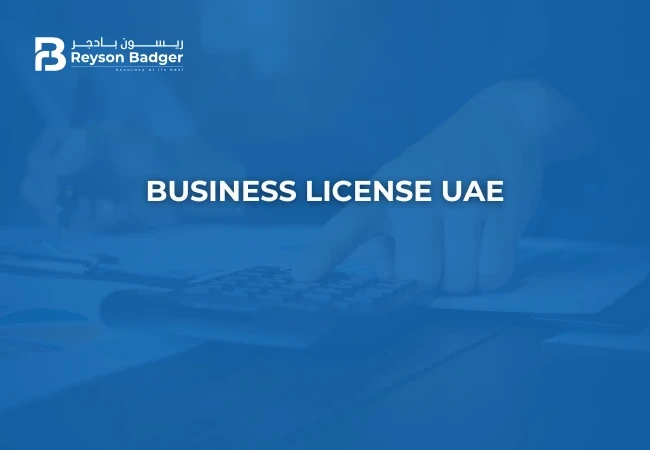
Business Licenses Services in UAE allows individuals and companies to participate in certain commercial activities in the country. This permit guarantees that businesses follow local laws and regulations, which differ based on the emirate and business type. Getting a business license is crucial for building trust with customers and partners, as it validates the business's registration and acknowledgment by authorities. With expert Business Licenses Services in UAE, entrepreneurs can navigate the complex licensing process and ensure compliance with UAE regulations.

In the UAE, several types of business licenses are designed to cater to various industries and commercial activities. Here are six primary types of business licenses:
| License Type | Purpose | Key Governing Bodies/ Approvals | Additional features |
| Commercial License | For businesses selling products or services (retail, wholesale, import/export). |
|
|
| Professional License | For individuals/companies offering services (consultants, doctors, accountants, IT). |
|
|
| Industrial License | For manufacturing or production businesses. |
|
|
| Tourism License | For tourism and hospitality businesses (travel agencies, hotels, tour operators). |
|
|
| Agricultural License | For farming, livestock, or fisheries businesses. | Ministry of Climate Change and Environment (MOCCAE) |
|
| Educational License | For educational institutions (schools, universities, training centers). |
|
|
| Crafts License | For individuals/businesses in skilled trades and artisan activities. | Department of Economic Development (DED) |
|
Determine the type of business activity your company will undertake this will dictate the type of license you need and the legal structure options available.
Depending on your requirements and location preferences, select the appropriate business structure, such as a Limited Liability Company (LLC), Free Zone Company, or Branch Office. Each structure has different requirements and benefits.
Choose a unique business name in line with UAE naming regulations. Terms and Conditions for choosing a business name are:
Every business in the UAE needs a physical address to operate. The chosen premises must meet the standards set by the Department of Economic Development (DED) in the relevant emirate, local zoning regulations, and municipality guidelines. In Dubai, tenancy contracts for office or warehouse spaces must also be registered through the Ejari portal, managed by the Dubai Land Department.
Prepare and submit your application with the required documentation to the Department of Economic Development (DED) or relevant free zone authority. Required documents typically include your passport copies, business plan, and license application form.
6. Pay Licensing Fee for Business License
After receiving approval, pay the licensing fee. Fees vary depending on the business activity, structure, and location. Once paid, you will receive your business license, to officially start operations in the UAE.
For Information on Business License Issuance and Renewal Services Click here
Reyson Badger simplifies the process of getting a Business License in the UAE. Our skilled team makes the complicated licensing procedure easier by ensuring adherence to all legal requirements. We take the time to understand your business needs and provide customized solutions that align with your goals. By choosing Reyson Badger, you can focus on growing your business while we handle the licensing details with expertise.
How to verify a Business License in UAE?
You can verify a UAE business license online through the respective Emirate's Department of Economic Development (DED) website. Enter the license number or company name for verification. Each Emirate (e.g., Dubai, Abu Dhabi) has its DED portal.
How to Cancel a Business License in UAE?
To cancel a UAE business license, gather documents, apply via the DED or Free Zone Authority, obtain clearances (labor, visa, etc.), appoint a liquidator (if needed), publish a notice, and finalize with the authority after paying fees. This process varies by Emirate and company type.
In UAE, What is the Cheapest Business License?
The "cheapest" UAE business license depends on your activity, location (free zone vs. mainland), company structure, and visa needs. Free zones, especially in Sharjah and Ras Al Khaimah, often offer more affordable options. Research thoroughly and consider all costs beyond the initial license fee.
What are the costs associated with obtaining a business license?
Costs vary significantly based on the type of license, location (mainland or free zone), and business activity. They include license fees, registration fees, and potential sponsorship fees.
What is the difference between a mainland and a free zone license?
Can I Sell Online without a Business License in UAE?
In the UAE, conducting online sales as a regular business activity necessitates obtaining a valid business license. This regulatory requirement is implemented to uphold consumer protection standards, ensure the quality of goods and services offered, and mitigate the risks associated with unauthorized commercial operations. Essentially, the government mandates licensing to create a structured and secure online marketplace, safeguarding both businesses and consumers.
How long does it take to get a business license in the UAE?
The time frame varies depending on the business activity and required approvals, but it can generally take from a few days to a few weeks.
How often do I need to renew my business license?
UAE business licenses typically require Annual Renewal. Timely renewal is crucial to avoid fines and operational disruptions. Specific requirements may vary by emirate and license type, so always confirm with the issuing authority.
For further detailed information check this page: Annual Business Renewal
What happens if I operate a business without a license?
Operating without a license can result in fines, legal action, and potential business closure.